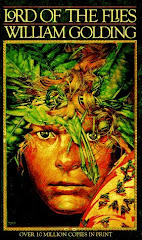
The Adam and Eve story is unavoidable. Even in art that does not mainly concern the loss of innocence, I keep coming across references to the "forbidden fruit". Just today for instance, I was watching "Pan's Labyrinth" for the first time in my Spanish class. The movie's main character, a young girl named Ofelia, comes face to face with the decision of eating a delicious grape during her quest to complete tasks leading her to the old labyrinth garden. Although instructed by a magical creature not to touch the feast that she will soon encounter in one of her trials, Ofelia is unable to resist a plate of juicy grapes once she comes across the table of food. This results in the awakening of a child-eating monster that chases Ofelia, who just barely escapes the close encounter. Similar to Adam and Eve, Ofelia exhibits the inability to resist temptation, even after being informed of the consequences.




